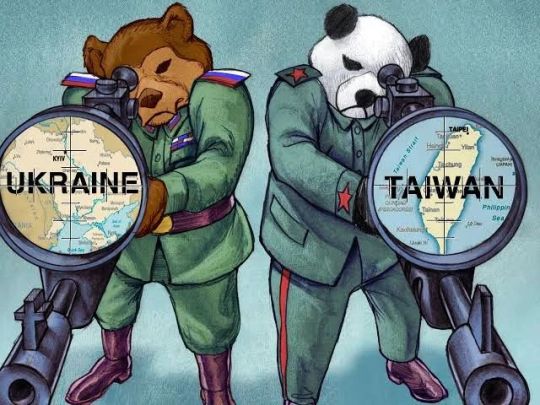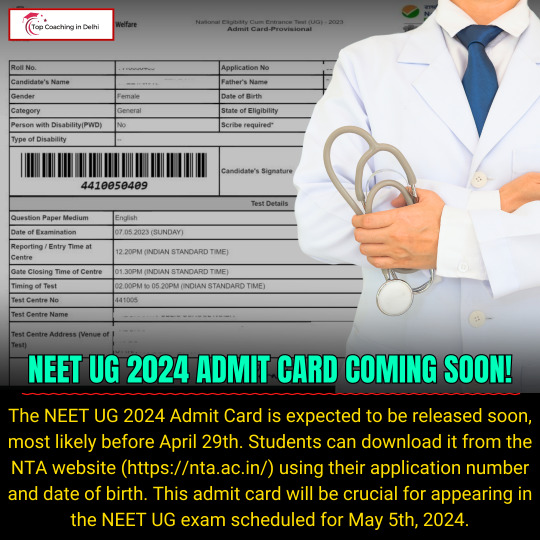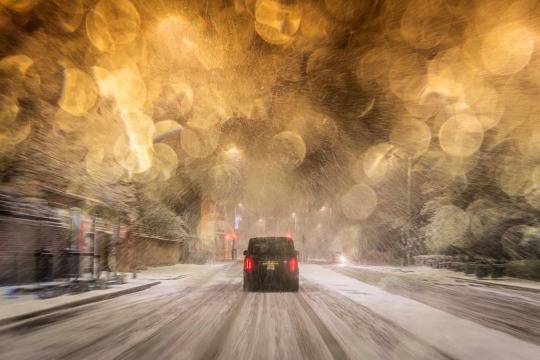#RussiaUkrainewar
Text
Analysis of: Tucker Carlson's interview with Vladimir Putin in Moscow, Russia (February 6th, 2024)
youtube
In the following text "document" refers to the subtitles of the video.
Summary of the evaluation:
Shows strong pro-Russian bias and lack of neutrality in its narrative framing
Relies on selective use of facts and anecdotal evidence that lacks context
Does not consider alternative perspectives in its analysis
Uses nationalist and emotionally charged rhetoric rather than impartial reasoning
Makes claims without providing clear evidence to support accusations
Downplays Russia's role in escalating tensions and conflicts
Fails to acknowledge the complexity of geopolitical issues and independence of other states
Does not present a clear or actionable plan for resolving conflicts
References history selectively to justify positions rather than provide nuanced analysis
Employs common propaganda techniques that aim to persuade rather than inform
As a result, the credibility and reliability of its claims are compromised and should be viewed skeptically without independent verification from other sources
In summary, the evaluation found the document exhibited strong biases, propaganda techniques, and lacked objective analysis, so its information cannot be reasonably accepted at face value.
Summary of the key points from the document
The interview was conducted with Vladimir Putin, the President of Russia, on February 6, 2024 at around 7:00 pm in the Kremlin building.
The interview focused primarily on the ongoing war in Ukraine - how it started, what is happening currently, and how it might end.
Putin provided a lengthy historical context on Russia and Ukraine dating back to the 9th century to explain the intertwined relationship between the two countries and regions.
NATO's expansion eastward after the Cold War and promises made to not expand NATO were broken, which contributed to rising tensions.
The 2014 coup in Ukraine and takeover of Crimea by Russia were discussed. Putin viewed these actions as responses to threats emerging from Ukraine.
Ongoing conflict in eastern Ukraine since 2014 in Donbas region escalated the situation further.
Putin blamed the West, especially the US, for interfering in Ukraine and backing nationalist forces there. This further complicated the relationship with Russia.
Putin expressed openness to negotiations but said the Ukrainian government under Western control had refused and prohibited any talks with Russia.
The goal of "denazification" in Ukraine, or dismantling nationalist elements, was discussed as one aim of Russia's military operation.
No clear path or timeline was outlined for how and when the conflict might end, as it depends on negotiations between the sides.
Key stakeholders
Vladimir Putin/Russian government: Intended to justify Russia's perspective and actions to international audiences. Provides an opportunity for Putin to shape the narrative.
Ukrainian government: The content directly challenges their claims and narrative around the origins of the conflict. May feel allegations need to be addressed.
Pro-Russia/separatist forces in Ukraine: Could view the content as validation of their cause and rhetoric used.
United States/NATO: Strong criticisms made of past policies and interventions. May feel need to rebut claims that their actions precipitated the conflict.
European allies: Also implicated in some of Russia's grievances. May impact their own strategic perspectives and policies towards Russia/Ukraine.
International media/viewers: Provides insights but heavily one-sided content requires verification and consideration of other viewpoints. Could influence their own views depending on their existing leaning.
Domestic Russian audience: Helps rally domestic support by sharing Putin's contextual justification behind military action in friendly terms. Validates government position.
Overall, key stakeholders that may be negatively impacted include those opposing Russia's position, while stakeholders aligning with Russia's stance may view it positively, though full verification of claims is not possible. International audiences would need to consider the content skeptically given its propagandistic intent.
Historical claims
Selective evidence: Only references history that supports its narrative, omitting inconvenient facts.
Lacks nuance: Presents a simplistic view that history demonstrates one dominant narrative of cultural/political unity, neglecting complexity.
Contextual flaws: Fails to situate events within full political/economic contexts of the time that challenge its interpretation.
Linear perspective: Implies a singular linear heritage despite periods where territories had different administrations and fluid national identities.
Unverifiable anecdotes: Uses individual stories but without caveats about anecdotes not being representative historical facts.
Propagandistic tone: Emphasis seems to use history more to legitimize current policies than foster informed, impartial understanding.
Overall, while some facts are referenced, the strategic cherry-picking, lack of qualifying context and propagandistic framing undermine the claims as a reliable, well-rounded historical analysis. Independent verification of dubious assertions and consideration of alternative interpretations would strengthen the analysis. A more impartial accounting of complexities, rather than selectively mining the past, is needed for reconciliation.
The ongoing war in Ukraine
One-sided: Provides only the Russian justification/reasoning for military action without acknowledging complexity or opposing views.
Propagandistic: Frames events and policy decisions selectively to shape public opinion in Russia's favor rather than objective analysis.
Downplays escalation: Minimizes Russia's role in ratcheting up tensions/fomenting conflict while emphasizing others' culpability.
Questions remain: Many assertions regarding intent/motivations cannot be independently verified and require third party corroboration.
Context needed: Standalone soundbites may mislead without considering broader geopolitical/historical factors at play on all sides.
Resolution details lacking: Fails to outline realistic measures to de-escalate/resolve actual combat and humanitarian situation for political settlement.
Biased perspective: Heavily subjective lens through Russian interests means data should not be accepted at face value without scrutiny/balancing with other sources.
In conclusion, while containing some factual data points, the propagandistic and strategically framed nature of much of the content means it provides limited reliable insight for objectively understanding complex realities on the ground or paths toward resolution when considered alone without verification and counterbalancing with alternate perspectives. Independent corroboration of claims would strengthen its informational value in relation to ongoing events. A more constructive approach balancing practical solutions with grand rhetoric appealing to past grievances could aid progress toward peace.
The intertwined relationship between Russia and Ukraine/related regions
Emphasizes shared history: Highlights linguistic, cultural, religious and economic ties developed over centuries to argue close bonds that persist.
Underscores complex interdependence: Acknowledges populations with mixed identity and that separation of interests cannot be simplistically reduced.
Risks essentializing identity: Framing cultural commonality primarily in ethnic/national terms risks overlooking internal diversity and fluidity of individual/group affinities over time.
Downplays compromising of sovereignty: Minimizes periods where territories shifted control between states in ways contradicting narrative of singular linear heritage.
Strategically wields interdependence: Selectively highlights interdependence for justification of policies while diminishing valid aspirations of populations within states for self-determination.
Risks inciting division: Hyper-nationalist rhetoric appealing to historical/ethnic affinities can encourage split loyalties counter to long-term reconciliation and cooperation.
Overall, while cognizant of factual interconnectedness, the subjective lens and selective contextualization undermine ability to constructively address autonomy/security interests of all populations in the region through cooperation instead of competition based on dated notions of control. A less politicized approach could strengthen prosperity for all.
NATO's expansion eastward
Emphasizes perceived promises broken: Puts focus on claims made to Russian leadership prior to expansion that seem to have fueled greater strategic mistrust over time.
Risks oversimplifying negotiations: Complex multilateral talks around expansion involved many trade-offs and perspectives beyond a single broken Russian pledge.
Associates expansion with provocation: Portrays expansions primarily as aggressive instead of considering them part of shifting countries’ autonomous security calculations and democratic processes over time.
Fails to address Russia's declining relative power: Does not acknowledge NATO expansion also coincided with Russia’s diminished standing amid NATO’s new economic successes—a reality challenging original diplomatic assumptions.
Inflames nationalist narratives: Rhetoric emphasizing broken trust and provocations serves more to stoke domestic support than understanding geopolitical contexts beyond a single state view.
Undermines joint security solutions: Recriminations over past actions hinder cooperation needed to mutually resolve tensions that expansion exacerbated between nuclear powers.
Ultimately a more impartial analysis recognizing multiple perspectives and Russia’s own declining economy could strengthen viability of modernized frameworks ensuring stability for all states in the region. But inflamed rhetoric risks further destabilization.
2014 coup in Ukraine
One-sided depiction: Entirely portrays the Maidan protests/change of government as a "coup" backed by the West without acknowledging internal Ukrainian political dynamics.
Simplifies complex situation: Reduces multi-faceted events to a simplistic narrative of foreign interference while minimizing domestic unrest with the existing government.
Undermines Ukrainian agency: Fails to acknowledge Ukrainian citizens exercised their own autonomous will through valid democratic processes, however imperfect.
Inflammatory language: Terms like "coup" aim more to provoke than objective understanding, fueling greater tensions versus reconciliation.
Interferes with impartial analysis: Biased framing complicates independent scholarly assessment by presupposing conclusions counter to realities on the ground.
Adds to conflict escalation cycle: Provocative rhetoric serves to justify intensified Russian policies of control rather than diplomacy to stabilize the situation cooperatively.
Overall, the inflammatory and conspiratorial framing reflects strategic propangandizing over impartial truth-seeking and risks entrenching conflict more than understanding it for remedies acceptable to all affected populations in the region.
Conflict in eastern Ukraine's Donbas region since 2014
Downplays Russian role: Minimizes Moscow's provision of arms, funding and other support to separatist militants escalating unrest into full conflict.
Portrays as internal Ukrainian issue: Depicts matter largely as a spontaneous reaction within Ukraine rather than proxy dimension involving regional powers.
Ignores ceasefire violations: Fails to address separatist shelling of Ukrainian military positions undermining negotiated end to hostilities.
Presents biased causality: Blames Ukrainian nationalism for conflict escalation rather than entanglement of external geopolitical machinations.
Hinders diplomacy efforts: Propaganda-tinged framing entrenches inflexible positions complicating efforts at durable political solution among adversaries.
Polarizes communities: Risks cementing deep societal divides within Ukraine through scapegoating rhetoric versus reconciling mutual interests.
Ultimately a more impartial diplomatic approach acknowledging shared responsibilities of all sides for adhering to negotiated accords could stabilize situation, whereas bellicose narratives risk making resolution ever more elusive.
Western interference and support for nationalist forces in Ukraine
Lacks substantive evidence: Makes strong accusations but provides no hard proof beyond conjecture to substantiate claims of deliberate interference or backing.
Over-simplifies complex dynamics: Reduces multifaceted political events and social forces to a single narrative of foreign provocation for strategic objectives.
Ignores Agency of Ukrainians: Fails to acknowledge Ukrainians have their own aspirations and agency, reducing their actions entirely to external manipulation.
Propagandistic framing: Using such loaded terms as "interference" aims more to assign blame than impartial analysis, fueling further geopolitical divide.
Undermines diplomacy: Inflexible stances based on unverified claims rather than cooperation poison relations needed to resolve tensions.
Risks entrenching conflict: Inflammatory rhetoric serves political agendas more than reconciliation by polarizing communities and cementing "us vs them" mentalities.
For an accurate understanding, verifiable evidence rather than speculation would be needed to substantiate such grave accusations. Overall, more constructive bilateral diplomacy based on mutual respect seems needed to reduce tensions versus contested nationalist histories.
Openness to negotiations
One-sided portrayal of negotiations: Implicitly frames Russia as open and others as refusing, without acknowledging Russia's own preconditions or role in escalating conflict.
Overlooks legitimacy concerns: Fails to acknowledge Russia's military intervention compromised Ukraine's ability to freely determine its negotiating partners and priorities.
Ignores sovereignty issues: Downplays how negotiations involving annexation of territory damage Ukraine's sovereignty and constrain its autonomy.
Reduces complexity: Simplifies challenges as unilateral refusal rather than recognition of good-faith differences in priorities and pressures each side faces.
Propagandistic language: Terms like "Western control" aim more to assign blame than impartial understanding of domestic political realities in Ukraine.
Risks hindering diplomacy: Inflexible stances based on contested claims likely poison the trust needed to make progress via cooperation.
Overall a more balanced and less accusatory perspective acknowledging the multifaceted challenges for all sides could better support constructing diplomatic solutions than divisive rhetoric that risks further entrenching conflicting positions.
Claims about "denazification" in Ukraine
Lacks evidence: No proof is provided that Ukraine's government is actually controlled by neo-Nazis rather than populists.
Reductive argument: Labeling opponents as Nazis downplays Ukraine's own complex nationalist narratives and marginalizes non-extremist concerns.
Echoes propaganda tropes: Uncritically uses terms common in Russian propaganda narratives meant to de-legitimize Ukrainian sovereignty claims.
Ignores nuance: Fails to acknowledge nationalist sentiments exist across many post-Soviet states and do not equate support for extremism.
Potential pretext for control: Could serve to justify open-ended Russian interference by setting impossible standards of "purity" no society fulfills.
Exacerbates tensions: Provocative and stigmatizing discourse damages reconciliation by casting political opponents as ultimate enemies.
Overall, applying explosive labels without evidence risks ratcheting up conflict more than resolution. Diplomacy requires acknowledging diversity of perspectives across interconnected societies in an even-handed manner respectful of all.
The document does not provide a clear path or timeline for how and when the conflict might end.
Some key evaluations:
Lacks specifics: No concrete diplomatic proposals, ceasefire terms, peacekeeping arrangements, political settlement details are outlined.
Vague on resolution: Goals of "de-Nazification" and protecting Russian speakers are nebulous with no roadmap for verifiably implementing and concluding them.
Unilateral focus: Emphasis remains on justifying Russian positions rather than outlining mutually agreeable compromises all sides could accept.
Omits compromise: Fails to acknowledge peaceful resolution requires good faith concessions rather than unilateral enforcement of preferred outcomes.
Propaganda over pragmatism: Rhetoric prioritizes blame over practical cooperation needed to stabilize violence and uplift humanitarian crisis.
Risks prolonging conflict: Absence of a negotiated ‘end state’ vision sustains ambiguity fueling continued escalation by attrition over years.
Overall, the document provides a justification for conflict rather than the inclusive diplomacy essential for its verifiable resolution. Specific proposals balancing interests of all affected communities would better support a durable political settlement and lasting peace.
Quality of reason
Logical Consistency: While some points are logically put, selective evidence and logical fallacies undermine internal consistency.
Use of Evidence: Some facts are cited but heavily skewed interpretation. Questionable anecdotes presented without qualification undermine evidential quality.
Impartiality: Highly partial framing fails tests of neutral principle and omits consideration of counter perspectives.
Objectivity: Subjective lens is not balanced with acknowledging room for alternate views in analyzing multifaceted problems.
Avoidance of Prejudice: Nationalist rhetoric & victim-blaming falls short of impartiality needed for sound understanding across cultural divides.
Clarity: At times difficult to separate statements of fact from interpretations without independent verification due to blending.
Proportion: Overemphasis of some details distorts overall perspective; disproportionate time spent on pet issues vs balanced treatment.
Overall, while containing sporadic well-reasoned points, the pervasive biases, fallacious arguments, skewed use of evidence and lack of impartiality compromise a prudent, well-reasoned analysis. Claims require verification and should not be accepted at face value due to departures from standards of sound rational judgment in evaluating complex, multifaceted problems. Alternative viewpoints would aid critical examination.
Logical fallacies
Cherry picking/selective evidence - Only presents evidence that supports Russia's narrative while omitting alternative perspectives and facts that do not fit its position.
Appeal to history/tradition - Justifies Russia's claims by presenting selective usage of long history between Russia and Ukraine while glossing over periods counter to its stance.
Strawman - At times implies opponents believe certain extreme claims like inevitability of conflict when actual positions are likely more nuanced.
Blaming the victim - Presents Ukraine's actions after 2014 coup as provocative while minimizing Russia's own role in escalating tensions.
Whataboutism - Deflects from discussion of its own positions by pointing fingers at flaws of other countries instead of addressing the issue directly.
Conspiracy theory - Implies US/NATO desire for conflict is due to entrenched interests rather than geopolitical disagreements, without substantive evidence.
Anecdotal evidence - Supports some claims with unverifiable stories presented as factual rather than illustrative.
Overall, while containing factual information, the document undermines its own credibility through the extensive use of biased reasoning, selective framing of history and deflection tactics - suggesting the overall narrative is propagandistic rather than a good faith analysis of complex geopolitical issues. Independent verification of questionable claims would be needed.
Bias
Strong Pro-Russian Government Bias: The narrative and framing of issues is constructed entirely from Putin's perspective without acknowledging alternative views.
Lack of Neutrality: No attempt is made to present a balanced, objective analysis. The explicit aim appears to justify Russia's actions rather than explore complex geopolitical issues impartially.
Selective Omission of Facts: Important context like the full history of Russian-Ukrainian relations and Russia's role in previous escalations are omitted or downplayed.
Exclusive Reliance on Anecdotal Evidence: Unverifiable stories are presented without caveats alongside real facts/events, obscuring what's factual.
Appeals to Emotion: Nationalist rhetoric, victim-blaming other parties aims to elicit emotional agreement with Russia's view rather than reasoned analysis.
Propaganda Techniques: Common tactics like misrepresentation, distractions and cultivated confusion compromise the credibility and verifiability of claims.
Lack of Transparency: Readers are not actively informed of the high level of bias shaping the content and prevented from considering alternative perspectives.
In conclusion, the heavy ideological leaning and propagandistic approach mean the document cannot reasonably be considered an objective analysis and should be treated skeptically rather than taken at face value due to the pervasive biases compromising its reliability and Trustworthiness as a factual account. Independent verification of claims would be needed.
Based on the content and tone of the document, Putin's position comes across as more autocratic than democratic:
Unilateralism: Decisions around Ukraine are portrayed as responses to threats rather than through consultation/compromise.
Top-down narratives: Public understanding is shaped through one-sided messaging rather than open debate of diverse views.
Propaganda techniques: Appeals to emotion, misdirection and confusion undermine standards of transparency/informed consent.
Deflection of responsibility: Focus is on others' actions rather than constructive solutions or acknowledgment of all sides' contributions.
Power centralized: No acknowledgement of other Russian political voices or dissenting domestic public opinion on policies.
Ideological direction: Strategic aims framed by inflexible notions of sovereignty/tradition rather than mutual understanding.
Limited accountability: Public positions subject to little oversight/correction from independent institutions or population.
Victimized identity: Depiction of Russia as acting in defense rather than partnership suggests diminished civil norms.
While democratic values like open debate/transparency are paid lip service, the substance, framing and control of public discourse suggest more autocratic tendencies in how policy issues are addressed and public perspectives are shaped on the international stage.
Rhetorical propaganda devices
Whataboutism: Deflects criticisms of Russia by accusing others of similar or worse actions.
Selective omission: Leaves out important historical/contextual details that undermine Russia's narrative.
Loaded language: Uses emotionally charged terms like "coup" and "nationalism" rather than neutral terms.
Slogans over substance: Employs simple talking points rather than engaging opposing viewpoints.
Appeals to emotion: Invokes nationalist pride and victimization to elicit agreement rather than reason.
Black-and-white thinking: Presents a Manichean view dividing everything into opponents and allies of Russia.
Scapegoating: Blames outside forces rather than address Russia's own role in tensions and conflict.
Confusion techniques: Provides rapid fire claims that are difficult to fact check, cultivating doubt.
The heavy reliance on these common propaganda devices aims more to persuade through emotional manipulation rather than inform readers or have an honest debate. It casts doubt on the document's credibility and objectivity.
Putin's personality
Confident: He speaks authoritatively about Russian perspectives and is unwavering in his views.
Nationalistic: He takes pride in Russian history and values cultural/political independence from the West.
Calculated: He provides nuanced perspectives but ultimate goals seem aimed more at justification than impartial problem-solving.
Frustrated: Past broken promises and perceived Western interference are sources of lingering grievances.
Defensive: He portrays Russia as reacting to external threats rather than examining Russia's own escalatory actions.
Selectively empathetic: He shows care for ethnic Russians affected by the conflict but disregards non-Russian Ukrainian suffering.
Conspiratorial: Tendency to see Western aims in geopolitical dynamics in calculated or intentionally provocative ways without evidence.
Pragmatic: Ready to negotiate but only from position of current Russian control in Ukraine gained via military operation.
Experienced: Has observed global events for decades but solutions still embroiled in outdated notions of great power politics.
Overall, while articulating nuanced perspectives, Putin comes across as ideologically hardened in defending Russian stances, erring more on the side of propaganda than impartial examination of conflicts' inherently complex nature.
Common evaluation criteria
Purpose/Goals: To present Putin's perspective on the conflict in Ukraine and his motivations/justifications for Russia's actions. He is able to fully explain his viewpoint.
Tone: Remains generally respectful and informative as expected in an interview format, though Putin appears firm in his views.
Balance: Both sides of issues are discussed but focus is on Putin providing context for Russia's actions. Interviewer occasionally challenges some assertions.
Factual Accuracy: Varies - some historical contexts and quotes check out but some claims around motivations of others involved are difficult to independently verify.
Perspective/Bias: Content is strongly from Putin's point of view without alternative perspectives included. Not surprising given the format but does not present a balanced analysis.
Flow/Organization: Answers are generally well-explained and on topic in response to questions. Occasional tangents into historical minutiae but overall coherent narrative.
Tone & Delivery: Putin comes across as confident and in control of the dialogue. Frustrations with past actions of others also come through at points.
Overall based on these criteria, the document accomplishes its goal of presenting Putin's perspective on the conflict in Ukraine through an in-depth interview format. However, the heavy focus on his point of view and lack of challenges to some claims mean the content cannot be considered a neutral or fully fact-checked analysis.
#UkraineConflict#UkraineInvasion#RussiaUkraineWar#NATO#Putin#RussianPolitics#UkrainianIndependence#UkrainianSovereignty#CrimeanAnnexation#DonbasWar#Luhansk#Donetsk#Propaganda#Disinformation#StateMedia#Ukrainiangovernment#UkraineArmedForces#RussiaNATOrelations#NATOEnlargement#RussianSecurityConcerns#UkrainianNationalism#UkrainianIdentity#UkrainianLanguage#MinskAgreements#Ceasefire#PeaceTalks#WesternSanctions#RussianSanctions#EconomicWarfare#WestvsRussia
3 notes
·
View notes
Text
Speaker Johnson has flip flopped from his earlier principled position of full support for Ukraine’s victory.
Turns out Speaker Mike Johnson was a beneficiary of Russian campaign funds for his political career! He and GOP congresspersons must join to pass Ukraine Aid and end hostage taking with unrelated crisis.
In fact GOP initially wanted a “stand alone” bill! May be someone could talk some sense into the Speaker, he has a job to do, “legislating”, and not play hostage games!
"A group of Russian nationals were able to donate to newly elected House Speaker Mike Johnson's campaign in 2018 by funneling the money through a U.S. company." – Ewan Palmer
One of the men behind the company, Nikolaev, an oligarch with close ties to Russian President Vladimir Putin, was also found to have financially backed Maria Butina, a Russian citizen who lived in Washington D.C. Butina was sentenced to 18 months in prison in 2019 after admitting to acting as an unregistered foreign agent to infiltrate conservative political groups and influence foreign policy to Russia's benefit before and after the 2016 election.” More at https://www.newsweek.com/house-speaker-mike-johnson-donations-russia-butina-1838501
#gophypocrisy#speakerjohnson#housespeaker#speakermikejohnson#democracymatters#internationallaw#lawsofwar#ukraine#armukrainenow#russiaukrainewar#stoprussia#uncharter#humanrights#peacekeeping#peaceandsecurity#peacethroughstrenth#justpeace#Newsweek.#gop#ukraineaid#speaker mike johnson#mike johnson
4 notes
·
View notes
Text
49 Lives Lost in Devastating Russian Attack, President Pleads for Support !!!

In a tragic turn of events, Eastern Ukraine witnessed the loss of at least 49 innocent lives on Thursday due to a Russian Attack with rockets on a village store. This horrifying incident ranks among the deadliest attacks in recent months and unfolded while Ukrainian President Volodymyr Zelenskyy was attending a crucial summit in Spain, seeking support from European allies.
Zelenskyy spared no words in denouncing the Russian Attack on the store and café in the village of Hroza, branding it a "demonstrably brutal Russian crime" and a "completely deliberate act of terrorism." He urgently called upon Western allies to fortify Ukraine's air defenses, stressing the imperative of halting "Russian terror."
The Ukrainian President expressed that Russia employs such acts of terror to normalize its genocidal aggression on a global scale. At the summit, discussions with European leaders revolved around strengthening Ukraine's air defenses, reinforcing its military capabilities, and securing the nation against the looming threat of terrorism.
Among the casualties, a 6-year-old boy tragically lost his life, highlighting the indiscriminate and devastating nature of the assault. Six other individuals were wounded, their lives forever scarred by this senseless act of violence.
The timing of this horrific Russian Attack couldn't have been more poignant. Zelenskyy found himself in Granada, southern Spain, attending a summit convened by the European Political Community—a body formed in response to Russia's full-scale invasion of Ukraine in February 2022.
As winter approaches, Zelenskyy emphasized the necessity of bolstering Ukraine's air defenses. He expressed optimism about the groundwork laid for new agreements with international partners, aimed at safeguarding Ukraine's critical infrastructure, particularly its power facilities, from potential threats that could exacerbate the challenges of the cold season.
Continue >>
Read the full article
#Kharkiv#Russia#russiainvadesukraine#RussiaUkrainewar#Russianattack#Ukraine#Ukrainegovernment#VolodymyrZelenskyy
2 notes
·
View notes
Text

Blood and Rust I
oil on canvas
90 x 110 cm
2023
2 notes
·
View notes
Video
youtube
398 War Days: RFA inside #Bakhmut Centre
2 notes
·
View notes
Photo

24 лютого 2022. Я прокидаюсь десь о 5.30. Поруч спить Льошик. До годування ще півгодини, відкриваю інстаграм. Пост у запорізькому пабліку: ПОЧАЛАСЬ ВІЙНА. Ґуґлю і не можу повірити. Чую гудіння, відкриваю вікна на балконі і розумію: військові літаки. Буджу чоловіка. Бігаю по квартирі у паніці - десять, двадцять хвилин? Роблю суміш дітям, годуємо. Телефоную рідним, друзям. Перша думка - тікати. Бігти. Вивозити дітей. Друга - а може, воно якось скінчиться швиденько? Третя - а що по бомбосховищах? З того дня я не маю жодного фото. Наступного дня почала заклеювати вікна. Це фото стало останнім із нашої квартири, де ми прожили рівно 8 років. Друге фото - ми з Евусею ховаємось у тамбурі підчас повітряної тривоги. #24лютого #роковини #війна #росіякраїнатерорист #украінськавійна #russiaukrainewar #stopputin #stoprussianwar #ukrainianrefugee #ukrainianmother #momoftriplets https://www.instagram.com/p/CpDDqesNi1A/?igshid=NGJjMDIxMWI=
#24лютого#роковини#війна#росіякраїнатерорист#украінськавійна#russiaukrainewar#stopputin#stoprussianwar#ukrainianrefugee#ukrainianmother#momoftriplets
4 notes
·
View notes
Text
Russian President Vladimir Putin called the Saturday bridge explosion in Crimea a "terrorist attack," adding that the "creator, perpetrators, and backers" were the Ukrainian secret services.
Putin was speaking during a meeting with the chairman of the inquiry team he formed to look into the bombing, according to Russian news reports. According to Ukrainian President Volodymyr Zelensky, at least 13 persons were killed by a Russian missile strike on Zaporizhzhia on Sunday, the latest fatal shelling of the southern Ukrainian city. According to the president's office, 89 people were injured in the incident, including 11 children. "Savages and terrorists" carried out "merciless attacks on harmless citizens" and residential structures, according to Zelensky.
Read More: https://unpluggedtv.in/putin-blames-ukraine-for-crimea-bridge-explosion/
2 notes
·
View notes
Link
Defence Secretary Ben Wallace updates the Commons on details over the UK providing tanks to Ukraine.#ukraine #russiaukrainewar #benwallace SUBSCRIBE to ou...
1 note
·
View note
Photo

🔥Hotspots. #Russia and #China work together to upend world order. #geopolitics Russia accused #US of direct involvement in #RussiaUkraineWar https://aje.io/b9w7xp China vows 'targeted military actions' in response to #Pelosi's #Taiwan visit https://www.channelnewsasia.com/asia/pelosi-taiwan-visit-china-vows-targeted-military-actions-2853616 https://www.instagram.com/p/Cgx-D8zLyTR/?igshid=NGJjMDIxMWI=
3 notes
·
View notes
Text

NEET UG 2024 Admit Card Coming Soon!
.
#NEETUG2024#examhelp#ThankYouFirstCoach#CarryKaBaapElvish#MIvsDC#RanbirKapoor#Dhruv_Rathee#LokSabhaPolls#Aranmanai4#IranIsraelConflict#RussiaUkraineWar#America#topcoachingindelhi#dubai
0 notes
Text
Sound Funky 2024 by Philgood 5336 Mix
Digital Crate Digging Continues check us out as we rock these venues from Atlanta to Louisville / Newburg from London to Johannesburg and from Pluto to Mars!
The saga / struggle continues check these menus for the healing process as we use the sound to erase as these scars!
Introduced by all those charlatans? oh yes, from Ukraine to the Gaza Strip they were unfathomably vile.
Smooth…
View On WordPress
#AlaiaandGallo#AngeloFerreri#DaLukas#discofunk#EugenioFico#housemusic#IsraelHamasWar#LupIno#ODogDayParty#poetry#RussiaUkraineWar#Sade#ThankfulThursday
0 notes
Text

Feel the Thrill: Experience the Excitement of Online Sports Betting in India
Ready to feel the thrill of online sports betting in India? Look no further than PlayInExchange.in! Our platform offers an exhilarating experience like no other, with free live streaming of your favorite sports events and amazing offers and promotions that will keep you on the edge of your seat. Don't miss out on the excitement – visit our site now, register, and start feeling the thrill today!
Feel the thrill with PlayInExchange.in today! Register now and enjoy free live streaming and incredible offers! Join us now and start winning big!
#leapyear#february29th#rareday#extradday#traditions#funfacts#history#leapyearproposals#aiart#copyright#artistrights#creativity#ethicalconsiderations#ownership#intellectualproperty#technology#futureofart#russiaukrainewar#warineurope#humanitariancrisis#sanctions#globalimpact#diplomacy#peacetalks#internationalrelations#refugees#metaverse#virtualreality#augmentedreality#futureoftechnology
0 notes
Text
Russia's Wagner leader Yevgeny Prigozhin claims over 20,000 fighters died in Bakhmut Battle

The number presented sharply contrasts with Moscow's assertion of around 6,000 casualties.
Wagner leader Yevgeny Prigozhin further acknowledged civilian casualties caused by the Kremlin's forces, contradicting Russia's repeated denial.
In a stunning revelation, the head of Russia's Wagner Group, a private military company, has announced that more than 20,000 of his troops lost their lives in the fierce Bakhmut battle. This declaration has sent shockwaves throughout the international community, raising questions about the scale and intensity of the Russia-Ukraine conflict.
The Bakhmut battle, which unfolded in a region engulfed by the ongoing Russia-Ukraine tensions, is known for its brutal and protracted nature. The involvement of the Wagner Group, an organization known for its clandestine operations and affiliation with the Russian government, adds an alarming dimension to the already volatile situation.
While the veracity of his claim cannot be independently verified, the sheer magnitude of the reported casualties demands attention and further investigation.
This disclosure sheds light on the often opaque and secretive world of private military companies, operating with significant autonomy and limited accountability. The Wagner Group, rumored to be involved in various conflicts around the globe, has drawn international scrutiny due to its controversial tactics and alleged human rights abuses.
The high casualty count raises concerns about the human cost of the Bakhmut battle and the toll it has taken on both sides of the conflict. The loss of thousands of lives highlights the gravity and intensity of the Russia-Ukraine War, underscoring the devastating consequences of such conflicts on soldiers and civilians alike.
The announcement also prompts questions about the strategic objectives of the Wagner Group and its role in the broader Russia-Ukraine conflict. While the group has claimed to be an independent entity, many suspect close ties with the Russian government, raising suspicions about Moscow's direct involvement in the Bakhmut battle.
The international community has called for transparency and accountability regarding the Wagner Group's activities and the casualties it has suffered. Accurate reporting of casualties is crucial not only for understanding the magnitude of the Russia-Ukraine conflict but also for ensuring justice and addressing potential violations of international humanitarian law.
The claim of over 20,000 casualties underscores the urgent need for an impartial investigation into the Bakhmut battle. Independent international bodies, such as the United Nations or the Organization for Security and Cooperation in Europe (OSCE), could play a crucial role in uncovering the truth and shedding light on the circumstances surrounding this tragic event.
Furthermore, this revelation should serve as a wake-up call to the international community regarding the dangers posed by private military companies. The lack of oversight and accountability surrounding such entities raises significant ethical and security concerns. A robust framework to regulate and monitor the activities of these groups is essential to prevent further loss of life and destabilization of Russia - Ukraine conflict zones.
The aftermath of the Bakhmut battle will undoubtedly require sustained efforts to rebuild and reconcile the affected communities. The scale of the reported casualties emphasizes the long-lasting impact of the conflict, necessitating comprehensive humanitarian assistance and support for the affected populations.
As the international community grapples with the implications of this startling revelation, it must redouble its efforts to find a peaceful resolution to the Russia-Ukraine conflict. Diplomatic channels, negotiations, and adherence to international law must be prioritized to prevent further loss of life and create a path towards stability and reconciliation.
The claim made by the Wagner Group's leader serves as a stark reminder of the devastating consequences of armed conflicts and the urgent need for concerted international action. The international community must respond with a unified voice, demanding transparency, accountability, and an end to the bloodshed that has plagued the region for far too long.
So The statement by the head of Russia's Wagner Group, claiming over 20,000 casualties in the Bakhmut battle, has sent shockwaves throughout the world. This revelation underscores the urgent need for an impartial investigation.
Read the full article
#attack#Bakhmut#easternUkraine#invasion#moscow#Russia#Russiagovernment#RussiaUkrainewar#Russianforces#troops#Ukraine#UkrainianCity#VyacheslavGladkov#Wagner#Warandunrest#YevgenyPrigozhin
2 notes
·
View notes
Text
Biden and Zelensky meet to discuss peace in Russia-Ukraine war
#russiaukrainepeace #russiaukrainewar #ukrainewar2020 #ukrainewarnews #zelenskybiden
0 notes
Text
Norway To Develop New Supersonic Missile In Collaboration With Germany In Response To The Threat Posed By Russian Hypersonic Missiles
According to Defence Minister Bjrn Arild Gramme (Sp), the Norwegian government will begin the development of a supersonic missile system in partnership with Germany. The defense minister Arild said, "We must start work today to develop the weapons that will protect us against tomorrow's threats. The new missile will strengthen Norway's defense capability and ability to fight targets at long distances and is scheduled to be ready in 2035."
Norway has already developed the National Advanced Surface-to-Air Missile System (NASAMS), a medium-range missile defense system designed and developed jointly by Raytheon and Kongsberg Defence & Aerospace, primarily for the Royal Norwegian Air Force (RNoAF) to identify, engage, and destroy aircraft, helicopters, cruise missiles, and unmanned aerial vehicles.
Please complete your reading from the URL below:
0 notes
Text









𝗧𝗵𝗲 𝗵𝘂𝗴𝗲 𝗽𝗿𝗼𝗯𝗹𝗲𝗺 𝘄𝗶𝘁𝗵 𝗨𝗦𝗔
(Photos from: Landscape Photographer of the Year 2023, Guardian)
Everyone who knows me is aware that I hold both very deep Love and Hate for the United States.
Many recognize that I consider the USA the greatest nation globally due to its diverse population, encompassing people from various continents. It's the only place where Europeans, Africans, Asians, and Middle Easterners have come together to create a society filled with exceptional minds, ideas, and opportunities. In essence, the USA stands as the world's epicenter, uniting humanity in the truest sense. However, it's no secret that I am also a staunch critic of American politics, wars, relentless corporations, and the super-riches who exploit the lives of people worldwide. I oppose the proliferation of firearms, which claim thousands of innocent American lives annually, and a deplorable healthcare system that continually blackmail Americans.
In a few words, as an American once told me long ago, "This is America, a country filled with contradictions. That's why only we can be America."
Now, let's turn to the topic: the upcoming 2024 American election is coming. Once again, we anticipate a contest between Biden and Trump, two figures whose previous campaigns deeply divided the nation, an impact still evident. Though the election is still some time away, the political atmosphere is already charged. This election holds unique significance because it coincides not with a pandemic, as we saw in the last one, but this time with two ongoing international conflicts that could have dire consequences: the Russia-Ukraine war and the Israel-Palestine issue. The world appears to be descending into chaos. As always, the USA plays a pivotal role on the global geopolitical stage, with each of its actions capable of either saving or imperiling thousands of lives, and any missteps in American politics can have profound global repercussions. To be clear, if the USA were to withdraw its support from sensitive regions like Taiwan, Israel, and Ukraine, the results could be apocalyptic. Conversely, if the USA's presence becomes more forceful, it may inadvertently push us toward a third world war.
Hence, the title of this post, "The huge problem with USA," highlights the idea that American elections are no longer confined to domestic concerns but are intricately linked to the world at large. It might be time to reconsider how we label these elections, as American politics have evolved into something far more global than ever before.
How about "World-American Elections"?
Anyway, That's all for Today!
Check out these Pics and 𝗥𝗲𝗺𝗲𝗺𝗯𝗲𝗿 𝘁𝗼 𝗟𝗶𝗸𝗲 𝘁𝗵𝗶𝘀 𝗣𝗼𝘀𝘁!❤️
💀☠️💀☠️💀
#HELMORT#America#election2024#biden#trump#americanelections#division#globalimpact#russiaukrainewar#israelpalestine#geopolitics#thirdworldwar#americanpolitics#americanelection#democracy#usa#war#global#foreignpolicy#politics#Taiwan#world#president#USA#future
1 note
·
View note